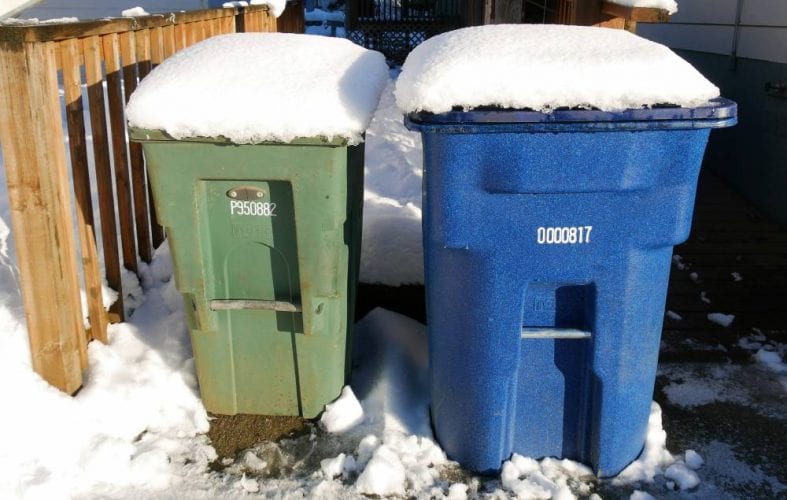
How sustainable is Petersburg’s trash and recycling program? That’s a question that spurred a borough assembly work session, February 6. With market prices changing for what recyclables are worth, the borough wants to find out how important the program is to residents.
Petersburg, like most Southeast communities, ships its trash and recycling down to Washington state. It’s cheaper than maintaining a local landfill and it doesn’t attract as many bears to town. But it costs money to move the waste off the island.
Public Works Director, Chris Cotta said, “It’s all about the cost. It’s all about the bottom line.”
Cotta says the borough has managed its waste program in an attempt to save money. That includes a co-mingled recycling system where residents put all their recycling into one bin at home and it’s picked up once a week. A few years ago, the borough took over the program from a private local business because it was cheaper.
The main variables now are what goes into the trash stream and what’s in recycling.
“The main gauge I’m using as to whether this is financially good or not is what’s our cost per ton for garbage versus recycling,” Cotta said.
In theory, the more that residents can keep out of the trash the lighter the shipment and the more money saved.
A known garbage problem is food waste. It’s heavy but there’s no current solution. There’s no system for large scale composting at this time.
Right now, the cost of trash and recycling is about the same and the borough is breaking even. But at times, the borough pays a little more to recycle or makes a little money back. How much recycling is worth changes according to the market.
In December, recycling cost the borough $96 a ton and in January it was $137. That’s more than in recent years because the value of recyclables has gone down across the country. Garbage usually costs the borough $120 a ton.
But it’s not just about how much recycling there is but the quality of it. Greasy pizza boxes are a common no-no. And unrinsed milk jugs. Cotta says the program loses its value if recyclables aren’t clean.
“If you don’t have time to rinse a milk jug,” Cotta said, “just go ahead and put it in the trash instead of put it in the recycling because then it contaminates all those recyclables.”
If more than 10 percent of the recycling is considered contaminated the borough would get charged an additional $150 dollars a ton. The borough has never been penalized like that before but administration is trying to avoid future problems.
Borough Manager Steve Giesbrecht said, “It’s an important thing for us to remember–they are looking at this stuff. And it can cost us—again not yet—but it can cost us quite a bit of money if they start not liking what we’re sending them.”
But recycling is not all about the money for some people.
Assemblyman Jeff Meucci, who is a diver for the Alaska Department of Fish and Game, says he sees plastic in the water all the time.
“I think as a good citizen we have to recycle,” Meucci said. “And it might cost us some money but I don’t think we can bury our heads in the sand and say, “Oh, we’ll just throw everything away” I don’t think that’s a progressive thing to do.”
Resident, Sunny Rice, says she’d separate her recyclables to keep the program going if needed.
Cotta says the borough has heard anecdotally from many residents who want recycling to stay the same but he says he wants to get more local opinions documented.
“Is there a way to get more complete data?” said Cotta. “Could we do a survey? Is there some way we can capture an accurate number? What percentage of the community wants this to continue?”
A survey won’t happen anytime soon. The borough would like to get it done before one of the recycling trucks retires and they have to purchase another one.
For now, the borough plans to focus on more community outreach and education on the current system. The Do’s and Don’ts of recycling and what could help the borough save money.











